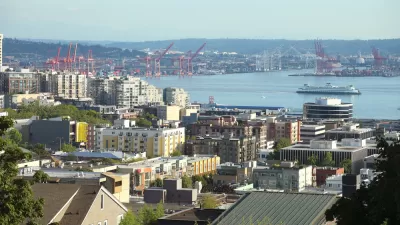More evidence that a common talking point of affordable housing opposition is more fear than fact.

Homeowners and other property owners have a history of opposing proposed affordable housing developments out of concern for their property values. Affordable housing projects will bring undesirable residents, crime, and blight to the neighborhood—according to this common line of thinking—and property values throughout the surrounding neighborhood will drop.
Except there is a growing body of evidence that suggests the common narrative is completely false.
Writing for the Urban Institute, Christina Plerhoples Stacy and Christopher Davis share recent research adds to the evidence for a more welcoming approach to affordable housing. The researchers used Zillow’s assessor and real estate database to estimate the relationship between affordable housing developments sales prices of single-family homes, duplexes, cooperatives, and residential condominiums between 2000 and 2020 in Alexandria, Virginia.
“We find that affordable units in the city of Alexandria are associated with a small but statistically significant increase in property values of 0.09 percent within 1/16 of a mile of a development, on average—a distance comparable to a typical urban block,” write the authors to explain their findings.
The entire report is available at the link below.
For more on the historic evidence of a similar benefit to property values from nearby affordable housing development, see also a Planetizen article about a Trulia study from 2016 and a Shelterforce article from 2012.
FULL STORY: Assessing the Impact of Affordable Housing on Nearby Property Values in Alexandria, Virginia

Planetizen Federal Action Tracker
A weekly monitor of how Trump’s orders and actions are impacting planners and planning in America.

Restaurant Patios Were a Pandemic Win — Why Were They so Hard to Keep?
Social distancing requirements and changes in travel patterns prompted cities to pilot new uses for street and sidewalk space. Then it got complicated.

Maui's Vacation Rental Debate Turns Ugly
Verbal attacks, misinformation campaigns and fistfights plague a high-stakes debate to convert thousands of vacation rentals into long-term housing.

Boulder Eliminates Parking Minimums Citywide
Officials estimate the cost of building a single underground parking space at up to $100,000.

Orange County, Florida Adopts Largest US “Sprawl Repair” Code
The ‘Orange Code’ seeks to rectify decades of sprawl-inducing, car-oriented development.

Maui's Vacation Rental Debate Turns Ugly
Verbal attacks, misinformation campaigns and fistfights plague a high-stakes debate to convert thousands of vacation rentals into long-term housing.
Urban Design for Planners 1: Software Tools
This six-course series explores essential urban design concepts using open source software and equips planners with the tools they need to participate fully in the urban design process.
Planning for Universal Design
Learn the tools for implementing Universal Design in planning regulations.
Heyer Gruel & Associates PA
JM Goldson LLC
Custer County Colorado
City of Camden Redevelopment Agency
City of Astoria
Transportation Research & Education Center (TREC) at Portland State University
Camden Redevelopment Agency
City of Claremont
Municipality of Princeton (NJ)





























